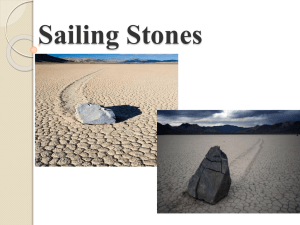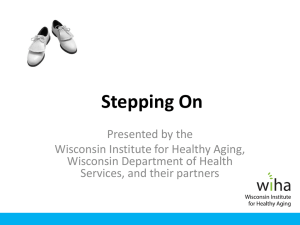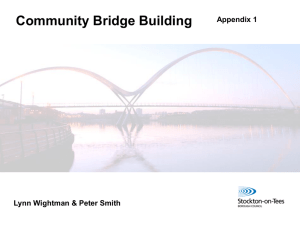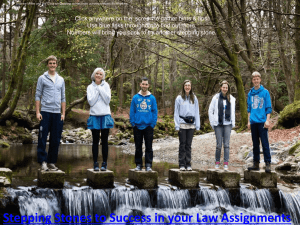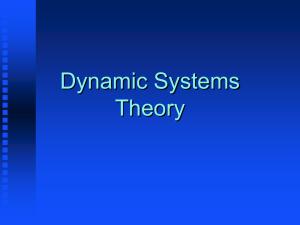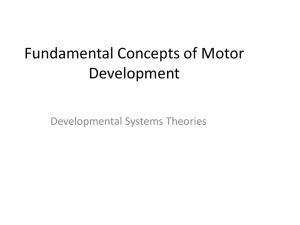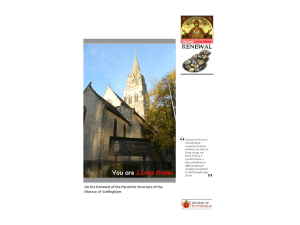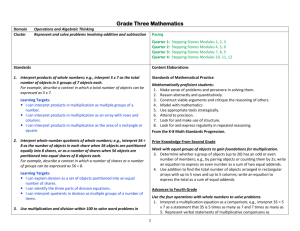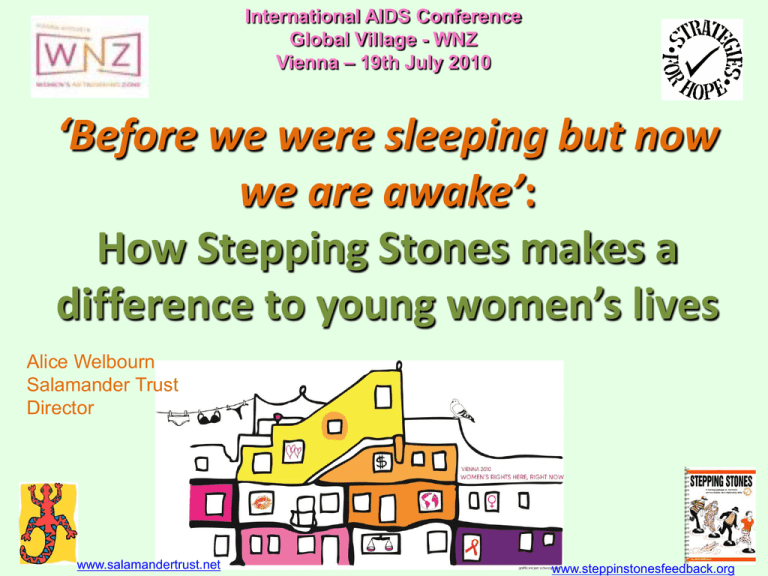
International AIDS Conference
Global Village - WNZ
Vienna – 19th July 2010
‘Before we were sleeping but now
we are awake’:
How Stepping Stones makes a
difference to young women’s lives
Alice Welbourn
Salamander Trust
Director
www.salamandertrust.net
www.steppinstonesfeedback.org
What is Stepping Stones?
• Training package on HIV and AIDS,
Communication and Relationship Skills, Gender
and inter-generational relations, and community
mobilization.
• Designed to enable participants to define,
analyse, articulate and realise their visions in
relation to various factors which influence their
sexual and reproductive health, HIV status,
gender and inter-generational relations.
What is Stepping Stones?
• Community-based programme (approach that
uses workshops and exercises to engage members
of a community). Package made of manual + DVD
• First workshop in Uganda in 1994 – manual 1995 :
longest running programme of its kind
• Author is Dr. Alice Welbourn – based on her social
anthropology PhD work in Kenya
• 1992: diagnosed HIV-positive desire to reach
out to other people facing similar situation,
particularly women
• Content = Gender + HIV – but broader remit –
Intergenerational dialogue.
The Participant as the principal actor
The shapes, sizes and strengths of these circles will vary
with context and time
Peers
Family
Me and my
sexual
partner(s)
Community
School
Stepping Stones is based on the SocioEcological Model of behavioural change
Socio-Ecological Model in the context of
violence against women
The 4 peer
groups’ paths…
YW
YM
OM
OW
Stepping Stones in Central America:
Paso a Paso
The 4 Themes..
PLANS
AHEAD
Plenary
4: WAYS IN
WHICH
WE CAN CHANGE
– K-N
3: WHY DO WE BEHAVE
AS WE DO? – G-J
2: HIV & SAFER SEX – E,F
1: GROUP COOPERATION – A,B,C,D
INTRODUCTION – Plenary1
Learning & teaching theory: Bloom’s taxonomy
Cognitive
domain
Stepping Stones Foundation Stones…
•
•
•
•
•
•
•
•
Four-peer group work and discussions
Interactive exercises
Discussions, role plays, and diagrams
Being able to address people’s own most pressing
needs
Ownership of the process by the community
Involvement of all stakeholders
Holistic response to HIV (linked with sexual and
reproductive health and gender issues)
Emphasis on gender and inter-generational
relations
Stepping Stones Foundation Stones…
• Nonetheless, in all adaptations there are pitfalls and we
strongly encourage those making their own adaptations
to stick to certain principles – or “foundation stones” as
we call them, as shown in this slide.
• Examples of pressing needs: young girls of 13 years of
age in Uganda talking to older men and officials on
sexual harassment
• Interactive exercises such as role plays (eg. men acting
as women in a very macho environment enables them
to experience women’s issues)
• Community owns the process so they use their own
ways of communicating and sharing eg pictures or
singing, dancing
• it’s a different way of addressing HIV: everyone is
involved and all social aspects are brought up
Fission and Fusion:
Lily Pad exercise
Outcomes of Stepping Stones...
Older Women’s Group, Uganda, 16 months after the workshop…
Older Women’s Group, Uganda, 16 months after the workshop…
Neighbours sharing and
supporting each other
Alcohol reduction
(so more $)
♀marriage
rights
Will-writing for
inheritance
rights
Care and support for
sick & their carers
Communication
(reduced IPV)
Talking to Children about sex
& relationships (prevention
education)
Peer-based condom
distribution
Blum’s theory:
A Contextual Model
Macrolevel
Environmental
Factors
Proximal Level
Environmental Individual
Factors
Factors
Response
Outcome
Biological
Factors
Policies
Involuntary
Response
Family
Neighborhood
Peers
Early Sexual
engagement
Individual
Response
Customs
School
Voluntary
Response
Social change
Temperament
& Cognitive
Factors
Examples of Stepping Stones
across the world
Central America
India: sex workers, people in prisons, braille
Post conflict settings (Mozambique, Liberia,
Uganda, Angola) – rebuilding communities
Stepping Stones development
Other contexts: LGBT communities (Caribbean),
Drug use (Myanmar, Russia& Central Asia)
The Stepping Stones community of practice
Central & Latin America
Plan International & Ayuda en Acción
•Countries: Guatemala, Honduras, El Salvador,
Nicaragua, Mexico & Ecuador
•Communities: indigenous, schools (peer training),
health workers, HIV-positive people
•Issues: Church (eg. Manuals in Honduras & El
Salvaldor) + early pregnancies, machismo,
homophobia, migration, sexual abuse (promiscuity)
Nicaragua – Gilbert Antonio
Stepping Stones /
Paso a Paso
trainer
Honduras – Cristhian I Cabrera
Asociación cristiana de jóvenes
Stepping Stones /
Paso a Paso
trainer
El Salvador – Maria Paz Callejas, PASMO
Stepping Stones / Paso a Paso trainer
INDIA
INDIA
Parinita Bhattacharjee
Karnathaka Health Promotion Trust
Post conflict settings
Mozambique, Liberia, Uganda, Angola –
Rebuilding communities
Other contexts…
LGBT communities (Caribbean)
Drug use (Myanmar, Russia & Central Asia)
English (by
SFH)
French (by
SFH)
Portuguese
South Africa
Ki-Swahili
Indian
Bengali
L American
Indonesian
Pacific
Other Languages…
•
•
•
•
•
•
•
•
•
Afrikaans,
Hindi,
Kannada,
Khmer,
Marathi,
Nepali,
Sinhala
Vietnamese
… and others…
Current International users include:
•
•
•
•
•
•
•
•
•
•
•
•
•
•
•
•
•
ACORD
ActionAid
Ayuda en Accion
CAFOD
Care International
Christian Aid
Concern Worldwide
DFID
Foundation for the Peoples of the South Pacific Islands
India Canada HIV/AIDS Project
IPPF
Plan International
Save the Children International
Tear Fund
UNICEF
USAID
…. And many other local organisations (and CBOs)
With whom has Stepping Stones
been Introduced?
Many different contexts: (see handout on assessment of
mental health in South Africa)
People with disabilities (eg India)
Pastors and Imams and their congregations (Kenya,
Gambia)
School pupils and teachers (many countries)
NGO staff (eg Tanzania)
People living with HIV and AIDS (eg Zimbabwe,
Namibia)
National and constituency AIDS Control Councils
(Gambia..)
Girls and boys out of school (many countries)
Women’s rights groups (many countries)
Health staff (Mumbai)
Drug using communities (Myanmar)
People in prison (Morocco, India)
University staff and students (Namibia)
The Stepping Stones
community of practice
•Self-organising group = not a network +6 conditions brought
together according to Swiss Development Agency (one of main
early sponsors of SS)
•Our CoP is about 700 members – common goal: tackling HIV and
gender issues in their communities (in Latin/Central America,
Africa, Caribbean, Eastern Europe, Central Asia, the Pacific and
South East Asia). Database growing
•To support the CoP: www.steppingstonesfeedback.org + forum +
emails + newsletters…
Questions ?
Monitoring and Evaluating
Stepping Stones
Gambia findings
A review of evaluations up until 2006 (T.
Wallace)
Regional evaluations (C. Am, South Africa, Fiji)
Worldwide structural review
“Hope” to be measured
What next
GAMBIA
GAMBIA
REGIONAL EVALUATIONS
SOUTH AFRICA
MRC cluster
CENTRAL AMERICA
Outcome Mapping
PACIFIC / FIJI
UNAIDS model / MSC
Self-assessment
GemScales
Worldwide Structural Review
WHO Quality of Life
Bath University
HOPES….to be measured
•
•
•
•
•
•
•
•
Appreciative Inquiry / Positive psychology
Mental health issues --> disability
Measuring Hope (Snyder, Barnett)
Power of assertiveness training
Power of preparing for death
Trust, love, spirituality
Community involvement/GIPA
Creating solidarity with all marginalised
people (including women and girls)
• Stepping Stones Plus…
What NEXT?
Only 18 sessions
Stepping Stones in Buwenda
revisited
Role of Microcredit
Ongoing developments
Stepping Stones PLUS
Stepping Stones for Children
Thank you
Alice Welbourn
Amandine Bollinger
Salamander Trust
www.steppingstonesfeedback.org
info@steppingstonesfeedback.org

